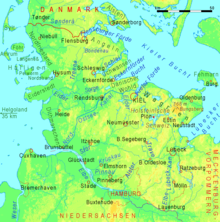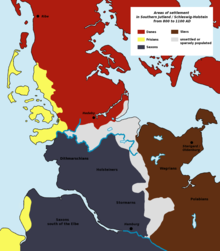
Angeln (Danish: Angel) is a peninsula on the Baltic coast of Jutland, in the Bay of Kiel. It forms part of Southern Schleswig, the northernmost region of Germany. The peninsula is bounded on the north by the Flensburg Firth, which separates it from Sundeved and the island of Als in Denmark, and on the south by the Schlei, which separates it from Schwansen. The landscape is hilly, dotted with numerous lakes. The largest towns are Flensburg, Schleswig and Kappeln.
Angeln is notable for being the original homeland of the Angles, a Germanic tribe that migrated from what is now Northern Germany to Great Britain during the Age of Migrations and founded the kingdoms of Mercia, Northumbria and East Anglia. The Angles would ultimately give their name to England.
Glücksburg Castle in Glücksburg and Gottorf Castle in Schleswig were the original seats of two historically important dynasties, the House of Glücksburg and the House of Holstein-Gottorp.
The place-name is first attested in Widsith, an Old English poem dating to the 6th or 7th century. It has been linked to the Germanic roots *angulaz ("hook") and *angw- ("narrow"), and may have originated as a name for the Schlei. It is unclear whether the ancient Angeln corresponded to the region now denoted by the name or whether it was of greater extent.[1]

Angeln is one of four peninsulas lining the Baltic coast of Schleswig-Holstein, along with Schwansen, Danish Wahld and Wagrien. As part of the Schleswig-Holstein Morainic Uplands (Ger. Schleswig-Holsteinisches Moränenhügelland), formed during the Weichselian glaciation, these peninsulas are hilly and dotted with several glacial lakes.
The Angeln lakes are subdivided into the North Angeln Lake Group (Ger. Nordangeliter Seengruppe) and the South Angeln Lake Group (Südangeliter Seengruppe). The River Treene, with its main headstreams, Bondenau and Kielstau, rises in Angeln before flowing westwards to join the Eider, the historic border between the Danish and German realms.
The northernmost part of Angeln is the Holnis peninsula, which projects into the Flensburg Firth. The western part of the peninsula is known as Luusangeln ("light Angeln") because of its relatively light and sandy soil. This region represents a transition zone between the Angeln Uplands to the east and the Schleswig Geest to the west. The Schleswig Geest in turn merges into the tidal marshes of North Frisia.
Apart from Flensburg, which is an independent town, the Angeln peninsula belongs to the district of Schleswig-Flensburg, Germany's northeasternmost district. This comparatively rural district had approximately 200,025 inhabitants in 2018.
The largest North Angeln lakes are:
The largest South Angeln lakes are:
The chain of hills running across Angeln between Husby and Kappeln constitutes the drainage divide between the Baltic and North Seas. East of it, small streams mostly called Auen flow towards the Baltic. West of it, most streams flow towards the Treene and later the Eider and hence into the North Sea.
The Treene is the longest tributary of the Eider, and its two headstreams, Bondenau and Kielstau, rise in and flow through Angeln. The sources of the Bondenau are in Mohrkirch and in Sörup-Sörupholz. At Mittelangeln-Bondebrück the Südensee Au joins the Bondenau. The Kielstau rises in Sörup-Schwensby, passes through the Winderatter See and flows into the Bondenau at Großsolt, just before the Bondenau enters the Treßsee. Upon leaving the lake the river takes on the name Treene and leaves Angeln to the west. It enters the Eider at Friedrichstadt, which in turn enters its extensive estuary, the Purrenstrom, at Tönning.
The largest river system that flows entirely in Angeln from its sources to its mouth is the system of the Füsinger Au. This river is called Loiter Au in its upper course and is formed by the confluence of the Boholzer Au (which is called Wellspanger Au in its upper course) and the Oxbek (which is also called Mühlenau, and whose longest tributary is the Flaruper Au). The Füsinger Au flows into the Schlei at Winningmay (municipality of Schaalby), east of Schleswig.
There are 10 officially designated nature reserves (Naturschutzgebiete) in Angeln:
There is also one nature park, Naturpark Schlei. The Haithabu-Dannewerk nature reserve lies just southwest of Angeln. It stretches along the Danevirke and around the Viking settlement of Hedeby, which constitute a UNESCO World Heritage Site.

Angeln is served by the Neumünster–Flensburg Railway, part of the Jutland Line, and the Kiel–Flensburg Railway. There is also a heritage railway, the Angeln Steam Railway, which runs between Süderbrarup and Kappeln.
The Bundesautobahn 7 runs along the western edge of Angeln, connecting Schleswig and Flensburg, before merging into the Danish Sønderjyske Motorvej.


The language most spoken in Angeln is German. However the peninsula is also part of the language area of Danish and Low German. The latter is more closely related to English than German is, since it was not affected by the High German consonant shift.
Before the 9th century Angeln was inhabited by the Angles, who spoke a West Germanic dialect that would later evolve into English. A language shift to North Germanic occurred following the departure of the Angles, when the peninsula was occupied by Danes. Danish became the main language of the region between the 9th and 19th centuries. In the 19th century another language shift occurred and the predominant language changed from the North Germanic Danish to the West Germanic Low German. Low German has since been gradually superseded by a variety of Standard German with Low German traits.
The variety of Danish indigenous to Angeln was Angel Danish, a dialect of South Jutlandic (the southernmost variety of Danish spoken on the Jutland peninsula, formerly spoken as far south as Eckernförde).
Danish continues to be spoken in Angeln by a minority but the dialects spoken nowadays